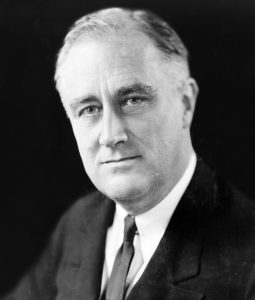Lecture Date: September 22, 2020

In the ranking of American Presidents, historians have traditionally placed only three consistently in the highest category of “greatness”: George Washington, Abraham Lincoln, and -- the only one in the twentieth century -- Franklin D. Roosevelt.
Roosevelt’s eminence derives from his handling of both of the two major challenges to confront the country since the Civil War: the Great Depression at home and World War II abroad.
The scion of an aristocratic New York family, like his distant relative Theodore, FDR faced several setbacks on his journey to the White House. On the political front, as a rising star in the Democratic Party, he was defeated in his bid for the Vice Presidency in 1920, a victim of the Republican post-World War I resurgence.
Potentially more damaging was the physical trauma that ravaged him the following year when he contracted polio. Though the disease left him physically impaired for the rest of his life, it did not break -- and indeed seems to have enhanced -- his spirit.
Some observers noticed that the disease had, in the words of historian Arthur Schlesinger, “purged him of frivolity and arrogance, enlarging his compassion and deepening his understanding.” Certainly it gave him a broader perspective on life. As he once put it, “If you had spent two years in bed trying to wiggle your big toe, after that anything would seem easy.”
Such resilience became crucial when in 1932, in the depth of the Great Depression, he was elected President, promising a “New Deal” for the American people. A heavily Democratic Congress under his leadership enacted a spate of legislation that expanded the reach of government to unprecedented levels. And, for the first time, the federal government established a nationwide retirement program with the creation of the Social Security system, perhaps the New Deal’s most significant long-term contribution to the nation’s welfare.
Although such initiatives assisted countless people in tangible ways, Roosevelt understood that more was needed -- that the nation’s fundamental confidence in itself had to be restored. Having chosen as his campaign theme song “Happy Days Are Here Again,” he memorably assured the American people in his inaugural address that “all we have to fear is fear itself.”
He augmented that optimistic outlook through a series of radio addresses -- the fabled “fireside chats” -- in which he spoke directly and confidently to the American people. And the nation’s collective gloom began to lighten.
To be sure, Roosevelt had his critics. Staunch conservatives, deeming him “a traitor to his class,” disparaged New Deal programs as “socialistic.” Isolationists distained his foreign policy, with some revisionists even alleging that he was complicit in the Pearl Harbor attack, claiming that the calamity was part of FDR’s plan to get the country involved in World War II because he had come to believe that it was the only way to fully revive the American economy.
Whatever the truth of such claims (questionable), Roosevelt’s role in resuscitating the ailing nation should not be discounted -- nor should the impact of his distinctive personality. In the days before television or (gasp!) Twitter -- the intimacy of Roosevelt’s “fireside chats” made a profound impression. “We can never forget,” recalled one admirer, “how he came into our homes, calling us his friends.”
His enduring popularity was demonstrated in his overwhelming election to unprecedented third (1940) and fourth (1944) terms as President, even though by the time of the last one, he was visibly in declining health. Indeed, only a few months later, he died, leaving the nation bereft
of the leader who had sustained the country through enormous challenges, both domestic and foreign.
Perhaps best summing up the sentiment of the American public in that moment was a young Congressman from Texas who, several decades later, would carry forward Roosevelt’s program of reform: Lyndon B. Johnson. Upon hearing of Roosevelt’s death, the future President sought to find words to express the gratitude of his generation. “He was the only person I ever knew -- anywhere -- who was never afraid,” he said. “God, how he could take it for us all.”
Published in the Free Lance-Star
September 20, 2020
Speaker: William B. Crawley
UMW Professor Emeritus of History
Director of Great Lives